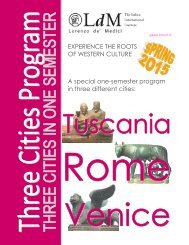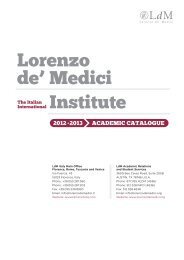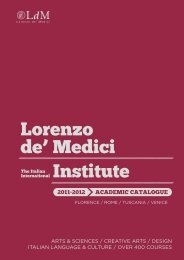aCademiC Catalog 2013-2014 - Lorenzo de Medici
aCademiC Catalog 2013-2014 - Lorenzo de Medici
aCademiC Catalog 2013-2014 - Lorenzo de Medici
Create successful ePaper yourself
Turn your PDF publications into a flip-book with our unique Google optimized e-Paper software.
FLORENCE<br />
School of Arts & Sciences<br />
Stu<strong>de</strong>nts will be familiarized with different perspectives on<br />
criminal behavior as well as etiology, risk factors, assessment<br />
and treatment in relation to different criminal behaviors. Recent<br />
research findings will be incorporated.<br />
Prerequisites: PSY 150 Introduction to Psychology, or equivalent<br />
Sociology<br />
Introduction to Sociology<br />
SOC 160 F<br />
Cr: 3; Contact hrs: 45<br />
Sociology is the study of human groups, organizations and<br />
societies and the patterns of similarity and difference among<br />
them. In this course, we will examine the major questions<br />
that gui<strong>de</strong> sociological analysis. We will also practice “doing”<br />
sociology by exploring our everyday social worlds and the<br />
oftentimes invisible or taken-for-granted social forces that<br />
shape it. Sociologists are concerned with a vast array of<br />
topics, and they approach the investigation of these topics in<br />
numerous ways. This course will introduce and draw stu<strong>de</strong>nts<br />
into our ways of seeing the world, provi<strong>de</strong> them with tools for<br />
un<strong>de</strong>rstanding our own social position and the conditions in<br />
which we live, and fuel our passion and vision for a just, equal<br />
and diverse society.<br />
Italian Cinema and Society<br />
SOC 201 F; Dual listed: MCT 200 F<br />
Cr: 3; Contact hrs: 45<br />
This course explores Italian cinema from its origins to the<br />
present time, within the socioeconomic and historical context<br />
of Italian culture and society. The course is based on the<br />
premise that film can be usefully employed for studying a<br />
society’s history and culture, including such areas as customs,<br />
i<strong>de</strong>ologies, discourses, gen<strong>de</strong>r roles and social problems. Areas<br />
of particular focus will inclu<strong>de</strong> Fascism, World War II, the<br />
economic miracle, the southern question, political terrorism<br />
of the 1970s, commercial television, the Second Republic, the<br />
Mafia, and the contemporary phenomenon of immigration.<br />
Along the way we will be looking at some of the major works<br />
of key directors, as well as at the most important genres of<br />
popular cinema, giving particular attention to the intellectual,<br />
historical, cultural, and literary matrix of each movie. Through<br />
analyzing the ways in which Italian cultural, social and political<br />
conflicts are portrayed and worked out both in art films and<br />
popular cinema, stu<strong>de</strong>nts will be encouraged to reach an<br />
un<strong>de</strong>rstanding of the possibilities of film both as work of art<br />
and as cultural document.<br />
Regions of Italy<br />
SOC 225 F<br />
Cr: 3; Contact hrs: 45<br />
Historically, Italy has passed more years as a patchwork of<br />
in<strong>de</strong>pen<strong>de</strong>nt or semi-in<strong>de</strong>pen<strong>de</strong>nt states than as one unified<br />
country. Even today, in the era of a single Italian state, this<br />
history of division and diversity has left a strong mark on the<br />
regions of Italy. This course will help stu<strong>de</strong>nts to un<strong>de</strong>rstand the<br />
historical, artistic, linguistic and cultural characteristics of each<br />
region and the many forces that have given rise to powerful<br />
local i<strong>de</strong>ntities across the country. Stu<strong>de</strong>nts will discover a<br />
plurality of Italies, each with its own rich culture, and in doing so<br />
they will be encouraged to reflect on broa<strong>de</strong>r issues concerning<br />
nationhood and i<strong>de</strong>ntity.<br />
Organized Crime: Sociology and History of<br />
Italian Mafia<br />
SOC 260 F<br />
Cr: 3; Contact hrs: 45<br />
“Mafia” is one of a long list of words – like “pizza”, ‘”spaghetti”<br />
and “opera” – that Italian has given to many other languages<br />
across the world. It is commonly applied to criminals far beyond<br />
Sicily and the United States, places where the Mafia in the strict<br />
sense is based. “Mafia” has become an umbrella label for a<br />
whole panoply of gangs - Chinese, Japanese, Russian, Chechen,<br />
Albanian, Turkish, and so on - that have little or nothing to<br />
do with the Sicilian original. This course is a history of the<br />
Mafia in Sicily. Some of the most famous American mafiosi,<br />
such as Lucky Luciano and Al Capone, will also be taken into<br />
consi<strong>de</strong>ration because the history of the Sicilian Mafia cannot<br />
be un<strong>de</strong>rstood without telling the story of the American Mafia<br />
to which it gave birth. The course analyses the Sicilian Mafia<br />
through a historical, social and cultural perspective, tracing its<br />
progression from the Unification of Italy to the present day.<br />
An analysis of the sociological aspects of the Mafia will be<br />
consi<strong>de</strong>red, including “the language of the mafioso”, “the co<strong>de</strong><br />
of silence”, the ways of violence, the social relationships within<br />
the organization, messages and messengers, structures of<br />
power, profits and losses, and the relationships between Mafia,<br />
politics, and religion.<br />
Italian Family and Society<br />
SOC 280 F<br />
Cr: 3; Contact hrs: 45<br />
The course explores the Italian family from a sociological point<br />
of view, placing the family in the context of Italian tradition<br />
and culture. It is subdivi<strong>de</strong>d into two main sections. In the first<br />
section we will begin with an historical analysis of the Italian<br />
family from the Romans to the present age, in or<strong>de</strong>r to analyze<br />
changes and traditions through several centuries. We will see<br />
that the patriarchal system un<strong>de</strong>rlies the entire history of the<br />
Italian family until recent times. We will analyze the meaning of<br />
the family at the present time and the importance of marriage<br />
in the past and cohabitation in present society. We will also<br />
consi<strong>de</strong>r key moments of transition in the life cycle of families,<br />
such as the constitution of a conjugal agreement, the place<br />
of children, divorce, the el<strong>de</strong>rly, and adoption. The impact of<br />
immigration on the <strong>de</strong>velopment of family lifestyles will also be<br />
examined. In the second part of the course each class will analyze<br />
in <strong>de</strong>tail the single members of the family. We will investigate<br />
rights and duties of wives, mothers, husbands, fathers and<br />
children in the family and we will evaluate the relationship<br />
between tradition and change in the evolution of these roles.<br />
We will also compare the traditional and conservative southern<br />
family to that of northern Italy.<br />
The Italian-American Experience<br />
SOC 290 F<br />
Cr: 3; Contact hrs: 45<br />
The course captures the <strong>de</strong>pth and the richness of the Italian<br />
American experience from the historical, social, political and<br />
artistic point of view. Topics inclu<strong>de</strong>: struggle for survival;<br />
adaptation and success of Italians in the US; their search for<br />
an i<strong>de</strong>ntity; and their impact and contribution to the evolution<br />
of American life and culture. The first part traces the role of<br />
Italians in the discovery and settlement of the New World and<br />
in the struggle for American in<strong>de</strong>pen<strong>de</strong>nce from England. It<br />
also provi<strong>de</strong>s a survey of conditions in Italy that encouraged,<br />
just after the unification of the country, millions to leave their<br />
homes for more promising economic opportunities available<br />
in the cities of the United States in the <strong>de</strong>ca<strong>de</strong>s after 1880.<br />
The second part is an examination of various aspects of<br />
the immigrant experience, including housing, jobs, politics,<br />
community institutions and the family. The third part traces the<br />
emergence of ethnic consciousness among Italian Americans in<br />
the post immigration era and the search for a new self-i<strong>de</strong>ntity.<br />
Sociology of Consumerism<br />
SOC 303 F; Dual listed: BUS 303 F<br />
Cr: 3; Contact hrs: 45<br />
The course will focus on the rise and <strong>de</strong>velopment of consumer<br />
cultures. The aim is to study and to apply interdisciplinary<br />
theoretical approaches to the study of consumer society<br />
now and in the past. The course will explore key substantive<br />
themes in the history and sociology of consumption, including<br />
the following: 1) an overview of <strong>de</strong>velopments in the different<br />
theories of consumer culture; 2) the rise of commercial<br />
society, the relation between freedom of choice and the power<br />
of commercial systems, mo<strong>de</strong>ls of consumer psychology<br />
and behavior, the nature of selves and i<strong>de</strong>ntities in a posttraditional<br />
world, prosperity and progress; 3) the way class,<br />
gen<strong>de</strong>r, ethnicity and age affect the nature of our participation<br />
in consumer culture; 4) the evolution of capitalism to the<br />
present day, as well as the history of commodities in a number<br />
of different settings (advertising, food and drink, fashion<br />
and clothes); 5) the social, cultural and economic context of<br />
specific consumer groups, as well as case studies of specific<br />
commodities.<br />
82<br />
LdM Aca<strong>de</strong>mic <strong>Catalog</strong> <strong>2013</strong>-<strong>2014</strong>





